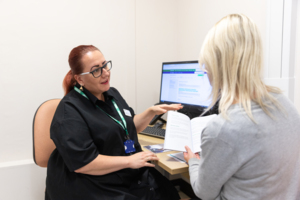
Making every assessment count: delivering value through holistic needs assessment (HNA)
Why are HNAs so important?
Conducting a Holistic Needs Assessment (HNA) offers a valuable opportunity to have a therapeutic interaction led by a person living with and beyond cancer. Furthermore, the HNA is a means, not an end, to supporting personalised care which will be determined through the actions agreed during the care planning conversation. The expectation to ‘tick the box’ and focus on numerical targets can be a distraction but shouldn’t deter health and care professionals from keeping the ultimate purpose and essential process of an HNA front and centre.
The NHS Long-Term Plan offers a comprehensive model of personalised care and commits to offering a holistic assessment of needs and care planning as a core intervention in personalised supportive cancer care (NHS England, 2019). A clear commitment to care planning is seen in cancer strategy across the UK nations (Wales Cancer Network, 2023; The Scottish Government, 2023; health-ni.gov.uk, 2019). HNAs provide a formal opportunity for health and care professionals to address person-centred goals, at key times in the disease trajectory. Individuals can then access timely support that is relevant, appropriate, and sufficient for their needs.
See also: Holistic Needs Assessments
What does the process involve?
As the person living with and beyond cancer works through the assessment tool, they can see that any practical, emotional, financial and/or spiritual concerns they may have, can be raised with equal importance alongside their clinical needs. Furthermore, Macmillan’s eHNA platform ‘ranks’ concerns based on the individual’s priorities, enabling their health and care team to promptly address the most acute issues identified.
Assessment and care planning process
- Person living with and beyond cancer completes the Concerns Checklist
- Joins consultation with professional to discuss concerns and co-create their care plan
- Discusses self-management opportunities and professional support available
- Receives information and resources, and appropriate referrals are arranged
- Receives a written copy of their completed care plan, which is also shared with other relevant professionals where required and with their consent, such as their GP
- Agrees a review date set with professional to monitor progress.
The steps laid out above highlight this is a process which should progress from identification of individual concerns to an in-depth care-planning conversation with a designated professional, appraising options and determining realistic goals to co-create the care plan (Le Boutillier et al, 2023). Whilst this conversation may well be regarded as an intervention, further actions are likely to be needed involving referrals to available resources and service and deciding on a review date.
Once the written care plan is completed it can then be shared (with permission) with the wider health and care team and utilised in their subsequent consultations. This saves repeating information, can endorse the action plan, and ultimately builds commitment to the process.
Delivering the value
As a HNA has become a central currency in personalised cancer care, there is the risk that the skill and time required to have a meaningful conversation aimed at addressing the concerns identified, gets overlooked (Briggs et al., 2023). For a HNA to be meaningful, the care planning conversation must be prioritised so that achieving resolution of the individual’s concerns remains the key goal.A systematic review of the impact of the HNA found that the way in which the HNA was implemented (i.e., quality of the interaction) played a key role in ensuring the support that followed met individual needs (Johnston et al., 2019). Therefore, our focus as health and care professionals should be on achieving a therapeutic interaction within the process, enabling in-depth exploration of need and a commitment to achieving successful care-planning solutions (Batalden, 2018, Briggs et al., 2020). When individuals are truly informed and engaged in planning and managing their care, experience and outcomes are improved (Turakhia and Combs, 2017). These factors will define the quality of the downstream care (Johnston et al., 2019) and ultimate value of the whole process.
Of note, Macmillan eHNA data from 2022 indicates almost 90% of individuals who submit their assessment using this platform have a care plan completed - a vital step in making a patient’s unique concerns known and addressed.
Potential Outcomes
Within the latest NCPES survey, published July 2023 containing data between April-June 2022, 66.0% of respondents reported a member of their care team helped to create a care plan to address any needs or concerns and of these 98.7% reported a member of the team reviewing the plan with them to make sure it continued to reflect their needs or concerns. The estimated percentage of individuals diagnosed with cancer who received a care plan via Macmillan’s eHNA platform in 2022 across the four nations is as follows: England 15%, Scotland 12%, Wales 6%, Northern Ireland 13%, shown below in the table by number of care plans completed.
Evidence suggests the content, delivery, and timing of personalised care planning differs across the four nations. (Young et al., 2015). We know the nature of the care-planning conversation will vary depending on the context and care setting as well as an individual’s concerns. A team response may well be required to address communication and information needs, symptom/concern management, as well as referral to appropriate services – all of which take dedicated space and time. However careful consideration should be given to who is most skilled, has the appropriate knowledge and is best placed to provide the supportive conversation.
How we can help
Macmillan offers a range of resources and services to support healthcare professionals in delivering best practice personalised cancer care.
Macmillan’s Learning Hub
Our education and training can be easily accessed on the Macmillan Learning Hub. By creating a free account, you can explore a range of practical and trusted resources to support you in your work.
Already got a Learning Hub account?
Not yet registered for the Learning Hub?
If you are a health and social care professional, you can register for the Learning Hub, and we will create your account for you.
Need help with your Learning Hub account?
If you have forgotten your password or you have a query about your Learning Hub account, get in touch.
Suggested resources
- Join Macmillan’s Personalised care and support planning network live meetings to share experiences and use the online community for great resources to learn more about implementation.
- Sign up for e-learning modules on Macmillan’s Learning Hub such as “What matters to me”. It explores the principles of having personalised conversations with people to develop a care and support plan that reflects what matters most to them, giving people living with cancer more choice and control over actions and decisions.
- You can also find more in-depth learning about the importance of supportive conversations leading to a care plan, that is agreed and shared with the person with cancer, from Guy’s Cancer Academy “Personalised care planning for people with cancer”. This includes videos of people with cancer talking about how they experienced the conversations with professionals.
- Explore useful resources to support health and wellbeing on the Learning Hub.
- There is an online community of learning resources for those using Macmillan’s electronic Holistic Needs Assessment. This includes the User Guide (also available on the My Care Plan platform) and a full range of How to Videos. Understanding the range of options for recording the progress of the assessments, monitoring, and managing them is key to ensure that your data is correctly recording the conversion of assessments to locked care plans.
- Macmillan’s eHNA has a Patient Portal so that the individual can return to see their own care plan, and all care plans that have been agreed and shared with them from different hospitals or other organisations. As a professional you cannot access their view of the Patient Portal, but you can see our helpful How to video which shows you what they will see.
Additional reading
- Making the Case for Integrated Personalised Care (PDF) brings together Macmillan’s evidence and arguments around why this new integrated and place-based approach to supporting people with cancer is needed.
- Elements of Successful Integrated Personalised Care (PDF) is a guide for system partners to help them understand the principles of Macmillan’s model of support and what we believe are the core elements in achieving a successful transformational change in local systems.,
-
References
Batalden, P. (2018) Getting more health from healthcare: quality improvement must acknowledge patient coproduction—an essay by Paul Batalden. BMJ 362, k3617.
Briggs, L., Cooper, J., Cox, K., Blake, H. (2020) Concerns, coping and the electronic Holistic Needs Assessment: experiences of UK breast cancer survivors. Journal of Research in Nursing 25(2), 97–110.
Briggs, L., Corner, J., Blake, H. (2023) Perceived Value of Holistic Needs Assessment in Supporting the Needs of Women with Breast Cancer. Cancer Nursing:10.1097DOI: 10.1097/NCC.0000000000001270.
Gov.ie (2019) National Cancer Strategy 2017 - 2026 (www.gov.ie) (accessed 27/10/23).
Johnston, L., Young J., Campbell, K. (2019) The implementation and impact of Holistic Needs Assessments for people affected by cancer: A systematic review and thematic synthesis of the literature. European Journal of Cancer Care 28(3), e13087.
Le Boutillier C, Jeyasingh-Jacob J, Jones L, et al. (2023) Improving personalised care and support planning for people living with treatable-but-not-curable cancer. BMJ Open Quality 12:e002322. doi:10.1136/ bmjoq-2023-002322
NHS England (2019) The NHS Long Term Plan. NHS England: London.
Turakhia, P. and Combs, B.(2017) Using principles of co-production to improve patient care and enhance value. AMA journal of ethics, 19(11) 1125-1131.
The Scottish Government (2023) Cancer Action Plan for Scotland, 2023-2026 Cancer action plan 2023 to 2026 - gov.scot (www.gov.scot) (accessed 27/10/23).
Wales Cancer Network (2023) A Cancer Improvement Plan for NHS Wales 2023-2026 executive.nhs.wales/networks/wales-cancer-network/cancer-improvement-plan-docs/full-plan/ (accessed 27/10/23).
Young, J., Cund, A., Renshaw, M., Quigley, A., Snowden, A. (2015) Improving the care of cancer patients: holistic needs assessment. British Journal of Nursing 24(4), S17-S20.
Stories And Media
-
Blogs 14 Jun 2024This blog is an opportunity to demonstrate Macmillan’s engagement with research particularly in terms of listening to the experiences of patients and staff and making healthcare improvements.
-
Blogs 11 Apr 2024Dr Hannah Tharmalingam, National Clinical Advisor for Macmillan, discusses what's new in prostate cancer screening and the potential impact on diagnostic testing for prostate cancer.




